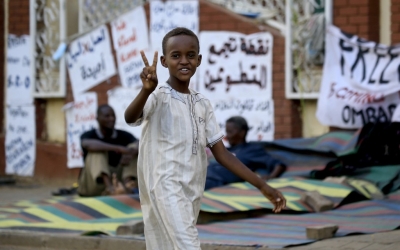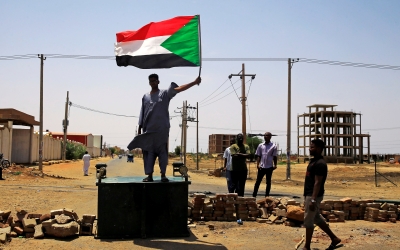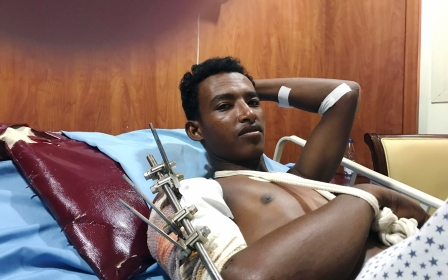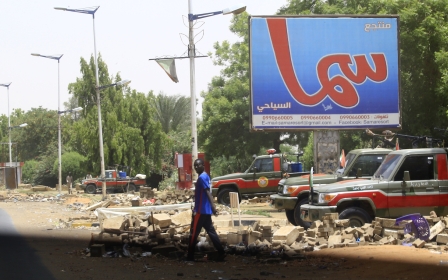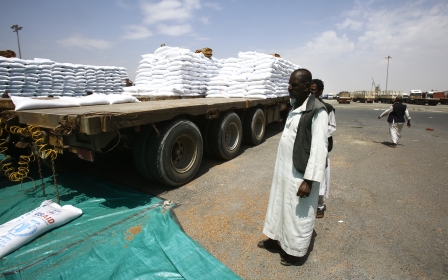Sudan: Could civilian-led government get country off US terror blacklist?
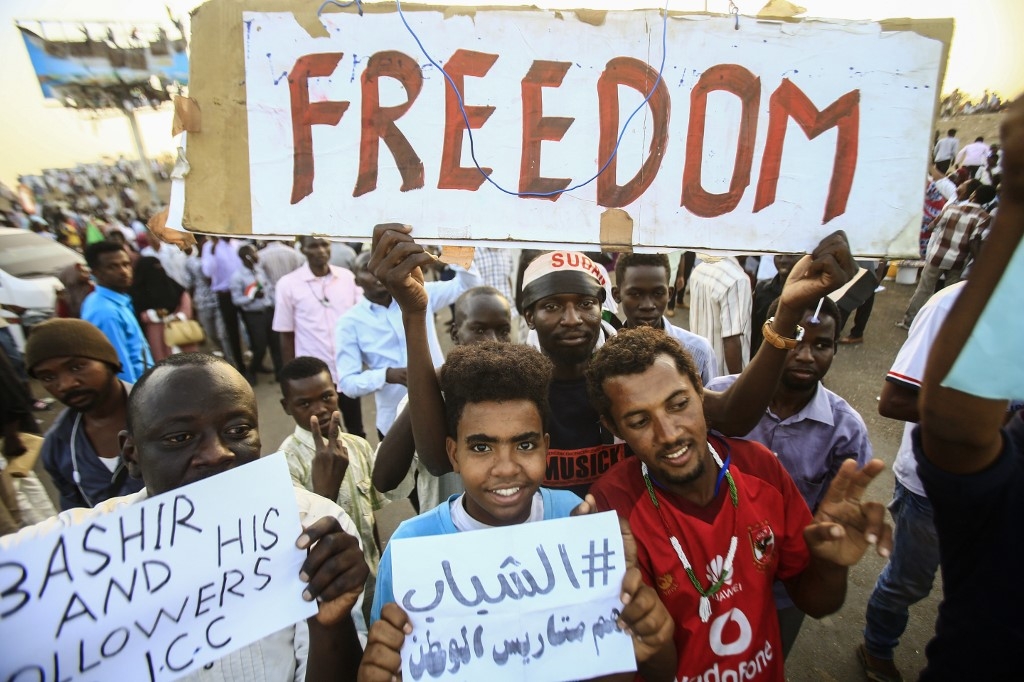
It has been 26 years since Sudan was placed on the US's State Sponsors of Terrorism (SST) blacklist over allegations that Omar al-Bashir's government was harbouring members of al-Qaeda and other extremist groups.
While the United States has not considered Sudan a supporter of terrorism for more than a decade, plans to remove the country from the blacklist have been put on hold as Sudan struggles to cope with its own domestic turmoil.
On 11 April, Bashir was removed from power following months of anti-government protests, ending his nearly three-decade rule.
The military then took over and established the Transitional Military Council (TMC), to the dismay of protesters, who have continued to call for a civilian-led government.
Sudan's protests: A brief timeline
+ Show - HideSudanese protests have evolved in the space of less than six months from complaints about bread prices to calls for long-term leader Omar al-Bashir to go and demands for a civilian-led transition to democracy.
Here's a summary of the key moments so far since the protests began.
19 December 2018: People take to the streets in the city of Atbara to protest against a government decision to triple the price of bread, torching a local ruling party office. By the next day protesters on the streets of Khartoum and other cities calling for "freedom, peace, justice". Police try to disperse the crowds, resulting in at least eight deaths. Dozens more will be killed in the weeks of protest that follow
22 February 2019: Sudanese President Omar al-Bashir declares a nationwide state of emergency. He swears in a new prime minister two days later, as riot police confront hundreds of protesters calling for him to resign
6 April: Thousands gather outside the army's headquarters in Khartoum, chanting "one army, one people" in a plea for the military's support. They defy attempts by state security forces to dislodge them and troops intervene to protect them
11 April: Military authorities announce they have removed Bashir and that a transitional military council will govern for two years. Despite celebrations at Bashir's demise, protest leaders denounce the move as a "coup" and the protesters remain camped outside army headquarters.
14 April: Protest leaders call on the military council to transfer power to a civilian government
20 April: Sudan's military rulers hold a first round of talks with protest leaders
27 April: The two sides agree to establish a joint civilian-military ruling council, but talks stall over differences in the composition of the council, with both sides demanding a a majority
15 May: With negotiators reported to be close to agreeing a three-year transition to civilian rule, military leaders suspend talks and insist protesters remove barricades outside the army's headquarters. Talks resume on 19 May but break down again on 20 May, with the opposition insistent that a civilian must head the transitional governing body
28 May: Thousands of workers begin a two-day strike to pressure the military rulers and call for civilian government
3 June: At least 35 people killed and hundreds injured, according to opposition-aligned doctors, as security forces firing live ammunition move to disperse the protest camp outside army headquarters
4 June: General Abdel Fattah al-Burhan, the head of the military council, announces that all previous agreements with protest leaders are scrapped and says elections will be held in nine months
Now, as the upheaval continues across Sudan, pitting opposition protesters against military leaders who can't agree on a transitional government, the prospect that Sudan will be removed from the US blacklist is unlikely.
New MEE newsletter: Jerusalem Dispatch
Sign up to get the latest insights and analysis on Israel-Palestine, alongside Turkey Unpacked and other MEE newsletters
"The last thing we should do is reward a coup by removing a country from that list because of it," said Jason Blazakis, former director of the US State Department's counterterrorism finance and designations office.
"They should be rewarded as a country only when a transition to civilian leadership has occurred," Blazakis, who is now the director of the Center on Terrorism, Extremism, and Counterterrorism at Middlebury Institute of International Studies, told MEE.
The US's terror blacklist was established in 1979 for countries that "repeatedly provided support for acts of international terrorism", according to the State Department website.
Libya, Iraq, Syria and the former country of South Yemen were the first states to be listed and sanctioned under the SST.
The sanctions cut countries off from financial markets, a move that can prove devastating for their economies. They also limit the kind of weapons countries can have and what goods they can export.
In addition, people and other entities under US jurisdiction are barred from doing business with countries on the list.
'A fundamental change'
In 2017, under the Obama administration, the US took official steps towards acknowledging what had long been accepted in counterterrorism circles: Sudan is no longer a state that sponsors terrorism.
The administration lifted a 20-year-old trade embargo on Sudan and talks began about the country's status on the blacklist.
But the process to remove a country from the blacklist is complicated and usually goes beyond the legal criteria of proving a state no longer supports terrorism.
"The US has always tied in political concession in addition to the legal criteria, but it has never done a very good job in explaining this bifurcated process that Sudan needs to uphold," Blazakis told Middle East Eye.
There are currently only four countries on the US blacklist: North Korea, Iran, Sudan and Syria.
And "removals off that list are fairly rare", Blazakis said.
In Sudan's case, part of the problem has been miscommunication, as US officials have struggled to make their demands clear to Sudanese leaders, he added.
In November, a month before the Sudanese protests first erupted over an increase in bread prices, the State Department announced that the US would consider taking Sudan off the list if certain conditions were met.
The main condition was that Sudan meet US standards on human rights and religious freedoms.
Three days after Bashir was ousted in April, the State Department said it would consider removing Sudan from the blacklist, but only if it saw a fundamental change in the government and a commitment not to support terrorism.
"A different statutory path to SST rescission may be available if there is a fundamental change in the leadership and policies of the government of Sudan," an unidentified State Department official told Reuters at the time.
The official did not go into detail about what those requirements were, however.
Civilian-led government
According to Blazakis, the US would consider taking Sudan off its terror blacklist if a democratic, civilian-run government were established.
The Sudanese government would then have to provide two things: proof that there is no evidence that it provides support for acts of terrorism, and assurances that it will not support such acts in the future, Blazakis said.
"Sanctions, in theory, should not be punitive, they should be preventative, and keeping Sudan on the list would be punitive.
"On the flip side, there are some foreign policy points that [the US] should try to get out of this before taking them off," he said.
Still, that first step - establishing a civilian-led government in Sudan - may take some time.
Since Bashir was pushed out in April, the Sudanese army's violent suppression of protesters has increased, culminating in a recent massacre in the capital.
On 3 June, the army killed more than 100 protesters after breaking up a sit-in protest in Khartoum.
Scores more were injured, and eyewitnesses reporting seeing dead bodies being dumped into the Nile River.
Talks between the opposition and the military have since broken down, with protest leaders saying the army must take responsibility for the June killings before it will agree to go back to negotiations for an interim government.
Against this tense political backdrop, Khalid Medani, chair of the African Studies programme at McGill University in Canada, said securing Sudan's removal from the US terror blacklist remains important to both the military council and the opposition.
"Getting off the list is a priority for both sides," Medani told MEE. "But it's looked at differently from the perspective of the military versus the perspective of the opposition."
For its part, the TMC would like talks with the US to resume because that would give it legitimacy and negotiating power, Medani said.
But from the opposition's perspective, knowing that the US would strongly prefer a civilian-led government be in place before the negotiations start may give them the upper hand in talks, Medani said.
In the meantime, he said that the State Department should reach out to mediate between the two sides, as well as provide aid to the Sudanese people.
"The State Department leading those kinds of efforts would be welcome by the Sudanese people," Medani said.
While Sudan's continued place on the blacklist bars the US from providing certain types of aid and support, Blazakis said the State Department can issue a waiver to get around those restrictions.
"If we're talking foreign military or defence components, things of that nature, you'd need a waiver, but if we're talking about humanitarian aid, that's something that is more feasible to provide," he said.
Earlier this week, the US announced it was sending a veteran diplomat to act as special envoy to Sudan in the hopes of helping with mediation efforts and to encourage a transition to democracy.
Donald Booth, a retired US ambassador, was deployed to "lead US efforts to support a political solution to the current crisis that reflects the will of the Sudanese people", said the State Department.
If those efforts are successful and a civilian-led government is established, the process of removing Sudan from the blacklist would likely happen soon, according to Blazakis.
"If there is this peaceful transition, that removal probably could occur pretty quickly once that civilian leadership is in place," he said.
"But it makes no sense for the US to negotiate the parameters of removing Sudan from the state sponsor terrorism list while the military still holds on to power."
Middle East Eye delivers independent and unrivalled coverage and analysis of the Middle East, North Africa and beyond. To learn more about republishing this content and the associated fees, please fill out this form. More about MEE can be found here.


